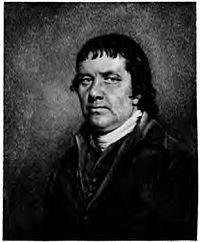William Hazlitt (Unitarian minister)
| William Hazlitt | |
|---|---|

The Reverend William Hazlitt, from a miniature portrait by his son John
|
|
| Born |
18 April 1737 Shronell, County Tipperary, Ireland |
| Died | 20 July 1820 (aged 83) Crediton, Devon, England |
| Resting place | Crediton Parish Church |
| Occupation | Unitarian minister |
| Alma mater | University of Glasgow |
| Spouse | Grace Loftus (1746 – 1837) |
| Children | John, Loftus, Margaret, William, Thomas, Harriet, Esther |
|
|
|
| Signature | |
William Hazlitt (18 April 1737 – 16 July 1820) was a Unitarian minister and author, and the father of the Romantic essayist and social commentator of the same name. He was an important figure in eighteenth-century English and American Unitarianism, and had a major influence on his son's work.
Hazlitt was born to Presbyterian parents at Shronell in Ireland, and was educated at a grammar school. He matriculated at the University of Glasgow in 1756, where he was taught by Adam Smith, Joseph Black and James Watt. Hazlitt was exposed to a range of controversial religious and philosophical views while at university, and it is possible that he converted to Unitarianism at this time. After graduating he became a chaplain to Sir Conyers Joscelyn at Hyde Hall in Hertfordshire, and then worked as a minister at Wisbech. In 1766 he married Grace Loftus, before moving to Marshfield in Gloucestershire. In the same year he commenced his literary career, when Benjamin Davenport and Joseph Johnson published Hazlitt's Sermon on Human Mortality.
In 1770 William and Grace Hazlitt, along with their sons John and Loftus, moved to Maidstone in Kent. Soon after their arrival, their son Loftus, only two and a half years old, died. A daughter, Margaret, was born in December. During this period Hazlitt maintained ties with figures such as Joseph Priestley, Richard Price and Benjamin Franklin, and was an active writer, contributing to Priestley's Theological Repository under the pseudonyms "Philalethes" and "Rationalis", and publishing five religious volumes. His work provoked a substantial body of writing by other authors. In 1778 his son William was born.
...
Wikipedia
